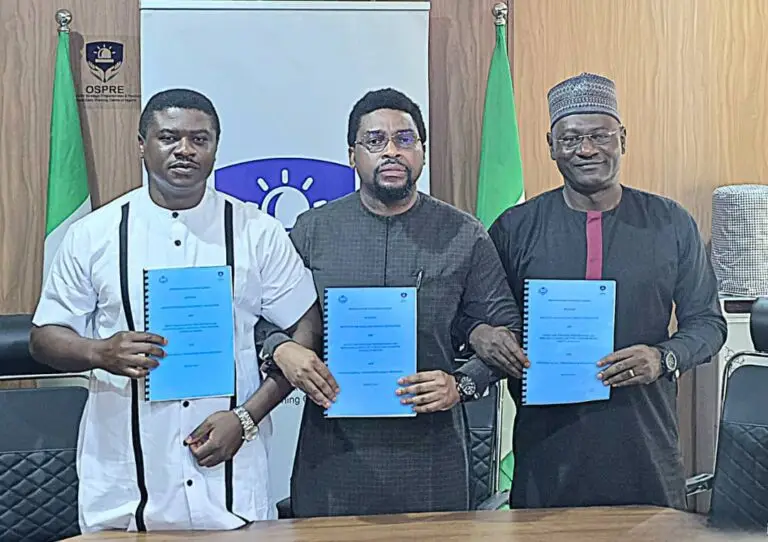IPCR, others sign MoU on national peace building
Peace
By Angela Atabo
The Institute of Peace and Conflict Resolution (IPCR) has signed a Memorandum of Understanding (MoU) with two other critical stakeholders, on peace building and conflict prevention in the country..
The other two stakeholders to the tripartite agreement are, Office for Strategic Preparedness and Resilience, (OSPRE), and Fortress360 LLC/TriplePeace Africa Initiative.
The News Agency of Nigeria (NAN) reports the agreement signed on Friday in Abuja aims to leverage the expertise and experiences of the three organisations to promote peace and stability in Nigeria.
The MoU is also aimed at strengthening partnership and collaboration on peace building, conflict prevention, and conflict transformation.
Dr Joseph Ochogwu, the Director-General of IPCR said the institute is a think-tank in conflict prevention, conflict management, and conflict resolution.
He underscored the importance of collaboration in conflict management and peace resolution in the country.
“The only way you can achieve peace in a complex and very intricate society like ours, or Africa, is through partnership, collaborations, and linkages.
“What we are doing with OSPRE, as well as Fortress 360, is actually to further widen the space of engagement with critical stakeholders,” he said.
Ochogwu said the trio would harness human, intellectual, material and networking resources to achieve their set objectives
Specifically, he said they would work on national peace policy to drive issues around peace building and achieve the necessary results.
Mr Chris Ngwodo, Director-General of OSPRE, also known as National Centre for the Coordination of Early Warning and Response Mechanisms said the MoU is apt.
Ngwodo said the MoU brought together stakeholders deeply involved in issues of social enterprise, peace building and development, among others.
“The areas covered by this MOU include, frontally, peace building, conflict prevention, conflict transformation, disarmament, demobilisation, and reintegration and all the broad cross-cutting areas that encompass peace building.
“We are bringing together people that have decades of expertise in every area of this particular field.
“We are pleased to enter into this partnership with IPCR and Fortress360 and this is simply to give documentary and concrete form to a partnership that has already been in existence, ” Ngwodo said.
On his part, Dr Paul Nyulaku-Bemshima, Executive Director. Fortress360, said they signed the MoU on the backdrop of a multi-track approach to dealing with multidimensional issues around peace in Nigeria.
He said: “As a social enterprise company, it is a rare privilege for us to bring our expertise on board.
“We have got a team of experts across a range of thematic areas around this work stream,” he said .
Nyulaku-Bemshima assured that his organisation would bring its expertise to bare in driving the peace agenda.(NAN)(www.nannews.ng)
Edited by Benson Ezugwu, Rotimi Ijikanmi





 He called for stronger collaboration between trade unions, the private sector, and the government to develop policies that protect jobs and equip workers for employment in the renewable energy sector.
He called for stronger collaboration between trade unions, the private sector, and the government to develop policies that protect jobs and equip workers for employment in the renewable energy sector. While acknowledging the
While acknowledging the 